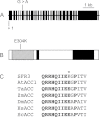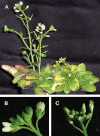The sensitive to freezing3 mutation of Arabidopsis thaliana is a cold-sensitive allele of homomeric acetyl-CoA carboxylase that results in cold-induced cuticle deficiencies
- PMID: 22791831
- PMCID: PMC3431002
- DOI: 10.1093/jxb/ers191
The sensitive to freezing3 mutation of Arabidopsis thaliana is a cold-sensitive allele of homomeric acetyl-CoA carboxylase that results in cold-induced cuticle deficiencies
Abstract
The sfr3 mutation causes freezing sensitivity in Arabidopsis thaliana. Mapping, sequencing, and transgenic complementation showed sfr3 to be a missense mutation in ACC1, an essential gene encoding homomeric (multifunctional) acetyl-CoA carboxylase. Cuticle permeability was compromised in the sfr3 mutant when plants were grown in the cold but not in the warm. Wax deposition on the inflorescence stem of cold-grown sfr3 plants was inhibited and the long-chain components of their leaf cuticular wax were reduced compared with wild-type plants. Thus, freezing sensitivity of sfr3 appears, from these results, to be due to cuticular deficiencies that develop during cold acclimation. These observations demonstrated the essential role of the cuticle in tolerance to freezing and drought.
Figures







References
-
- Baud S, Guyon V, Kronenberger J, Wuilleme S, Miquel M, Caboche M, Lepiniec L, Rochat C. Multifunctional acetyl-CoA carboxylase 1 is essential for very long chain fatty acid elongation and embryo development in Arabidopsis. The Plant Journal. 2003;33:75–86. - PubMed
-
- Bell CJ, Ecker JR. Assignment of 30 microsatellite loci to the linkage map of Arabidopsis. Genomics. 1994;19:137–144. - PubMed
MeSH terms
Substances
LinkOut - more resources
Full Text Sources
Molecular Biology Databases
Miscellaneous

